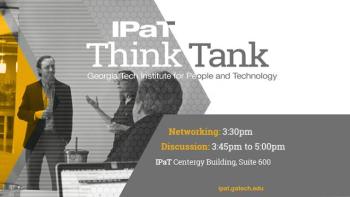IPaT Thursday Think Tank: Smart Cities, Smart Homes and Smart Lives: What If We Optimized Them for Wellbeing?

Description:
As we enter an era of connected devices, objects, systems, and infrastructure, combined with machine learning to make sense of the data, the possibilities to radically change our everyday experiences are tantalizing. Historically, when we’ve harnessed the power of new technologies, we’ve optimized (implicitly) for values like convenience, independence and private over public space. What values will we bring to this new era? What if we were to optimize for human well-being?
Moderator:
Steve Downs is the Robert Wood Johnson Foundation’s chief technology and strategy officer. In this role, he focuses on the practice of program strategy and on the alignment of the Foundation’s technology strategy and operations with its organizational directions. RWJF’s pursuit of a Culture of Health requires an approach to strategy that is highly flexible and adaptive. In his current role, Downs works with his colleagues to institutionalize an approach to program strategy that is based on the integration of learning, co-creation, and reflection into the processes of strategy development and ongoing strategy assessment and adaptation.
Since being appointed chief technology and information officer in 2011, Downs’ goal has been to ensure that RWJF staff have the resources they need to practice philanthropy at the highest level. He has emphasized technology directions—namely mobility and social CRM—that encourage informal knowledge-sharing, data-informed decision-making, and peer-to-peer engagement.
Since joining RWJF in 2002, Downs’ career at RWJF has proceeded along two parallel paths: management and programming. Along his management path, he served as the first team leader of the RWJF Pioneer portfolio, helping to shape the portfolio’s direction and initial body of work. From 2007 to 2011, Downs served as the assistant vice president of the Health Group. In this position, he worked with the senior vice president of the Health Group to oversee the Foundation’s strategies and investments in the areas of childhood obesity, public health, tobacco control, and support for vulnerable populations. He also played a key role in helping to shape and articulate the Foundation’s vision for transitioning to a “Web 2.0” philanthropy, one based on values of openness, participation, and decentralization.




